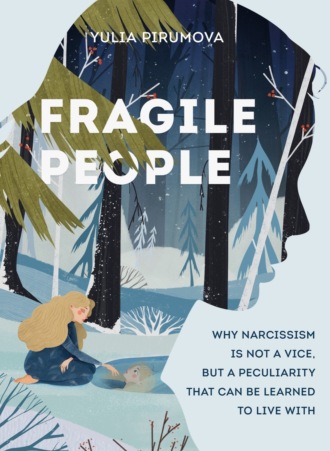
Полная версия
Fragile People: a Hidden Door into the World of Narcissists

Yulia Pirumova
Fragile People: a Hidden Door into the World of Narcissists
Preface
I have noticed lately how people are getting increasingly interested in the phenomenon of narcissism. But what is there to say on the matter that has not been said before? It is obvious that narcissists are troublesome and dangerous to their close ones.
Among this choir, there are yet voices that are not only willing to diagnose and condemn narcissism but also tell the story behind the psychological drama determining narcissists' character and the suffering they are prone to. I will write about narcissism from this point of view. But I would like to stress the essential: whatever psychological constitution we are characterized by, we are much more than our diagnoses, features of the character, and adaptation abilities. We are even more than the suffering that lies at the heart of all this. Thus, drawing on the character, the reasons behind it, coping strategies of a narcissist, I would ask you to see an individual behind all this. Not larger or smaller, not better or worse than anybody not sharing said characteristics.
What is more, this book is not just about narcissists. It is about their “secret” order: about those who barely resemble self-centered egoists. On the contrary, they are very-very “shy”. Unconfident, full of doubt, attacking themselves in response to any blunder or mistake. Worn-out and exhausted by the demands placed on themselves. And at the same time claiming to be strong, flawless, and being able to handle everything perfectly. Such hidden, or, in other words, deficient narcissism has a variety of manifestations, which I would attempt to present clearly as a whole picture, starting from the origins…
Introduction
When I started psychotherapy practice, I could not imagine that narcissists would become the main area of my interest. Of course, I knew who they were! Like everyone else, I thought they were egoists whose sole desire was to exploit the others.
I read numerous books telling us: “Beware of narcissists, they are everywhere, and their only dream is to use you. So, arm yourself with the knowledge to deal with their horrible nature. And may the force be with you!”
It reminds me of the joke about good people joining together to beat up bad people. But back then I was still “green” in terms of psychology and also almost fell for the popular science prejudices which could lead me to demonization of narcissism. But no! The deeper I studied this phenomenon, the better understanding of the features of people with narcissistic disorder I acquired. And the more I got interested, curious and even compassionate towards those whose narcissism appeared to be so wounded that they required such exceptional protection of their fragile “self”. Moreover, I got more and more convinced that narcissism is widespread today, but it is radically different from what we have always thought of it.
The era of “gods” and fragile self-esteem
“'I'm God!' – cries Kanye West into the camera. 'You're asking me who I am? I already told you, I'm God!' Kanye West is a god of a new breed. He is the most influential rapper of the decade. Wildly popular and fabulously rich. He is married to a phenomenally popular and incredibly rich woman. People line up to get his trainers just like for a holy communion. He is a god, he's got enough media outlets to be one. Basically, that's all he needs”.[1]
In the era of gods' self-proclamation, we are forced to make ourselves worthy every day, thus, somewhat preserving our self-esteem as compared to the “successful success”. Fragile as it is, it is now checked for strength by another story of a “god” having dropped in from the sky, who managed to get it all, immediately and faultlessly. It is presented not as an exception but an ordinary and natural way: going up and never down. To become not just successful but inimitably fortunate. One of a kind. Not like anybody else. Unique…
“All” or “nothing”.
“Perfect” or “nobody”.
“The nonpareil” or “a loser”.
That is our reality, which we crash against in the attempts to assert ourselves and be somebody. We want to be perfect and invulnerable. But that makes us dependent, drained and unhappy. And very lonely…
Deep inside we want to be accepted by people. To have good relationships. We want to love and be loved. But on the way to it we are sapped by a slow-acting force – seeing ourselves as unworthy of it all. Since we are not at the top of the social success pyramid, which all social networks are full of, we feel worthless and having achieved absolutely nothing. This is a narcissistic trap set for us by the time.
We want to buy this costly ticket to enter the so much desired world of normal people, where we will be seen, valued and accepted. But time after time, we put up a velvet rope for ourselves. We have to run a hundred times faster just to stay at the same point. We are worn-out by the attempts to assert ourselves but feel that we are simply marking time. And then again devalue our way and effort. And by doing so we slide down to the very base of our personal mountain of self-esteem and self-respect, which we were hopelessly trying to climb all the time.
We are ordinary people. And often, we are not narcissists at all. But almost all of us are scared of what will happen if everyone finds out that we are not anything special. Since it seems to us that our own achievements are insufficient to legitimately consider ourselves normal. As if we are pretending to be normal. Professional, knowledgeable, able to love. At the same time being full of doubt: “Is it really so? Or will someone come tomorrow and unmask me?”
Sometimes, nothing helps us feel confident. Neither certificates, nor MBA, nor money or even recognition from our family, friends or colleagues. Our inner customs officer either does not let it all in, devaluing upon entry, or allows to enjoy it for five minutes and then throws it away beyond the limits of our psyche. So, again we have to get involved in spurious fights for our own self-esteem. Modern narcissism is widespread not as a pathology but as a background level of anxiety about one's own value.
Many-faced narcissism
Everybody knows who narcissists are.
It is true that representatives of the classical version are the very notorious self-obsessed, self-centered people, egoists with a grandiose self-image. They expect everybody to show constant admiration and recognition. And all of their resources are spent on acknowledging their own greatness and significance. Representatives of this personality type consider themselves superior to others and are willing to prove it to everyone around, demanding attention and extra-special attitude. They are absorbed exclusively in themselves, not willing to notice anyone around. For them, the only way of communicating with people is exploitation. In other words, it does not matter who you are and what you feel. If you can be of interest to a narcissist, they never refuse to use you. Otherwise, you just stay beyond their sphere of attention. The only problem is that, according to some sources, such narcissists constitute only 1 to 4 per cent of all. Too few to seriously threaten yourself with dangers of communicating with them. And that is where it gets really interesting. Since, in fact, the world is full of narcissistic people.
But not like those who you constantly hear about from the authors denouncing narcissism. And not all those who proudly wear a narcissistic crown of omnipotence, egoism, and splendor. In contrast to those who brightly manifest a narcissistic pathology, we are now surrounded by other narcissists. They will not humiliate you or show how great they are and prove to what extent they are better than you. Quite the contrary! Their narcissism is also wounded. But instead of showing off, such narcissists have chosen a different adaptation strategy. The first impression is that these people have absolutely no relation to narcissism. But it is who they are. “Secret” narcissists. People who have exceptionally fragile self-esteem and emptiness for a self-concept.
They disguise themselves and hide.
They try not to show their inferiority to anyone.
Their constant companion is total dissatisfaction with themselves and low self-esteem.
They are unable to be proud of themselves and devalue all that is good and worthy about them.
They always want to be a better version of themselves but instantly feel ashamed, inadequate or inferior.
They refuse to do anything to avoid suffering a defeat or facing a failure.
They are afraid of close relationships, but loneliness also scares them.
Their inner world is much more complex than it seems at first glance.
The “inner ear” of self-esteem
Our brain has an organ of balance and spatial orientation – the vestibular system. It helps us maintain balance when body position changes. Without it, we would move like small children or drunken people, i.e. we would not be able to coordinate our own movement. The vestibular system is a part of one's inner ear, which carefully monitors his or her position in space. Self-esteem It continuously regulates one's view of oneself, namely continuously shapes a complex picture of a person's inner world. The “inner ear” of our self-esteem registers the slightest changes in the environment and self-perception at every moment of our lives, binding and adjusting the image of our “self”. It endlessly evaluates and compares itself with others in order to have a chance to absorb the insufficient, the lack of which stops it from being good. And this very inner ear may be healthy and construct healthy self-esteem, and it may be sick, therefore, significantly distorting the real picture. is a kind of our “inner ear” which helps us navigate ourselves and maintain balance between our self-perception and those who we actually are.
Let us imagine that someone called Olga has high self-esteem, while Kate has it low. We will start with the latter, since it is her who shares the convictions about herself that are so familiar to us. So, Kate's “inner ear” would not hear anything valuable about what she has got inside. It will be impervious to acknowledgment of her virtues and the way people see her. It will ignore Kate's achievements. If she actually succeeded in something and even if it was highly appreciated by the others, her “inner ear” would make out a tiny whisper: “Anyone can do it. You were nobody and remain nobody”. From reality, this “ear” would catch only the signals that unavoidably prove Kate's “badness”, failure, and neglect from other people. It would be sending out signals of rejection, detecting it even in a neutral attitude to Kate. It would be tuned to the frequency of alienation from people and self-discrepancy anywhere she goes. It would evaluate Kate on a negative scale from total unworthiness to medium badness, without entering the positive area. In case Kate managed to make a little step to the area of “self-normality”, her “inner ear” would inevitably establish in which area she is still not good or even inferior. So, no matter how people saw her or how she performed in life, relationships or work, her “inner ear” would perceive a distorted reality in which she remains bad and there is no way for her to change it.
Olga, in this sense, would be more fortunate. Her “inner ear” works properly, as a healthy part of the vestibular system. If there is a risk of falling, our body changes its position in response to the signal of this system. It also works like this with a healthy psyche: in case something that could negatively affect Olga's self-esteem happened, her “inner ear” would be tuned to itself. Thanks to that, Olga would remember her real virtues and expect support from those around her. Olga's reality is not full of hostility and unavoidable rejection. Olga sees things as they are and is ready to “hold on” to this view.
A good vestibular system has numerous nerve endings, which send out signals of the changes in the environment. Similarly, healthy self-esteem registers all that happens internally and externally: it notices both good, adding it to personal value, and bad, trying to correct it, compensate for it, or in extreme cases – displace it. Normal self-esteem helps us correlate real virtues and limitations and also continuously intercommunicate self-image with reality. It means that Olga's inner ear does not only hear “inside itself” but also “outside itself”, continuously comparing her self-esteem with the environment. Therefore, even if her self-esteem is the highest possible, Olga would still have to see and notice how other people perceive her and react to her.
So, what does the functioning of our “inner ear” tuned to maintaining good or bad self-esteem depend on? Why does Olga's “ear” catch positive evaluations and recognition, while no matter how much you praise Kate, she would still be in the “narcissistic negative”?
What matters here is how healthy or sick one's narcissism is. In fact, healthy narcissism also exists, and it is something that provides us with a foundation for positive and stable self-perception.
Why do we need narcissism?
To trust one's mind and to know that one is worthy of happiness is the essence of self-esteem.
Nathaniel Branden[2]Inside every person's psyche, there is a part responsible for self-respect and self-perception. As a special repository, it keeps everything that constitutes our self-esteem and helps to maintain it. That is narcissism, which is essential to all of us. Thanks to it, we have a stable self-concept and an understanding of who we are.
But before we actually start to understand anything about ourselves and evaluate our own personality, we need to accumulate enough initial narcissism, which is presented to us by our close ones. We will carry these savings with us as we go through life, gaining more and more information about ourselves. These narcissistic savings accumulate throughout life, enhancing our knowledge of ourselves. It becomes fuller, more diverse, and includes not only our abilities and talents but also our limitations. All that provides us with an opportunity to maintain a realistic view on ourselves and develop healthy self-esteem.
Healthy self-esteem functions the way a piggy bank works: parents invest in us the loving looks, positive reflection, support of our hobbies and talents, recognition of our abilities and pride in our achievements. As they are collected, our “self” becomes more stable and gets healthier. We obtain knowledge about ourselves, our place in this world and relationships with others, our abilities and talents. We develop self-awareness and start relationships with people based on our desires and needs. We can forgive ourselves for the mistakes made and learn lessons from any experience. Thanks to all that, our life potential is growing, and we are enriching ourselves.
However, there is also a reverse side of the coin: the fewer investments we have received, the less healthy narcissism we have gained. Instead of savings, we might have plain deficiency for all what is left of our childhood. All narcissistic disorders are shaped exactly in this area of emptiness and deficiency: it is not limited to not feeling loved or valued. Such people sometimes do not sense themselves at all without constant confirmation of their own value and significance.
Narcissism is not just an area where self-esteem appears, is being maintained and adjusted. It is also an essential psychological need of every person. Thus, it is natural to:
• want attention and positive feedback;
• want to be recognized and respected;
• want a realistic reflection from other people;
• be good for others;
• have merits, success and be proud of them;
• be aware of your talents, abilities, and limitations;
• set short-term and long-term goals for yourself and make plans;
• consider how valuable you are for the others;
• see the value of other people to you;
• continuously increase self-awareness, the understanding of your needs and abilities;
• present your talents and skills to the world;
• enjoy what you have inside and share it with the others.
All of these are natural and normal needs of every person! And as a whole, they are features of healthy narcissism, the inexhaustible source of self-respect and continuous confirmation of self-worth.
However, I am sure you would agree that not all of us are lucky to have such narcissism. On the contrary: almost everyone today is having difficulty fulfilling these needs, some to a greater extent, some – to a lesser. Let us explore various manifestations of narcissism.
The narcissism scale
Imagine a horizontal scale with divisions, numbered -100 to +100. The far-right point will indicate the abovementioned healthy narcissism as a state of narcissistic norm and integrity. I assume that such people exist. That they really have no problems with their self-esteem, self-respect, and self-perception. Stressing the word “really”. Since there is abundance of those who compensate for inferiority claiming that “they're fine” in a purely external manner. Healthy narcissism as a deep normality, as a feeling of dignity accompanied by adequate reliance on one's own achievements and experience is a rare but a factually existing phenomenon.
Picture 1. Narcissism scaleLet us assume that +100 point of the scale is a narcissistic norm and then mentally move left. Imagine: at the far-right point, a person is full of self-worth, significance, able to evaluate their virtues adequately, while as we move left, the richness of narcissistic resources is gradually transformed into emptiness and deficiency. The closer to the left edge of our scale the person is, the lower self-esteem they have, therefore, the stronger the defense, the weaker the feeling of one's value and significance. The deeper the feeling of worthlessness and inferiority, the more they want to suppress and hide it for the sake of preserving themselves.
The -100 point, which is associated with the extreme degree of narcissistic pathology, indicates malignant narcissism. Let us assume that the whole range of such disorders lies between -100 and 0. Such people's narcissism is so wounded that it seriously distorts reality, in which they fight for the right to be absolutely grandiose and independent, magnificent and unique. And since this area is quite pathological, the means they choose for the protection of their humble “self” are far from graceful or appropriate. You must have heard quite a few bloodcurdling stories about narcissistic perverts and psychopaths, psychologically abusing those around them.
And now I will speak to you with the intonation of a tourist guide:
“Look to your right – there are rare lucky people with healthy narcissism. They live, reach their goals, communicate with other people, and can be very happy indeed. And then look to your left and again see a similarly rare category of people: representatives of pathological or malignant narcissism. They can also be quite happy. It is their close ones who are suffering. The narcissists themselves do not care, they just live their lives. And now let us look at the middle of our scale and meet narcissistic 'neurotics'. That is where the majority of us are…”
This area includes combinations of various narcissistic features, qualities, and states. We cannot say that people displaying such qualities have a narcissistic personality disorder. Yet they share common features, which I will be describing in all the subsequent parts of this book.
These people have a lack of healthy narcissism, which hinders self-awareness and fulfillment of their potential. Even a slight deficiency in the sphere of narcissism might recurrently bring us into quite an unpleasant state of self-discrepancy, inferiority, unworthiness, our own “badness” as compared to other people. We may feel extremely anxious about the fact that our life is passing by, but we still do not “measure up” or have not achieved anything. That is how narcissistic neurosis begins, a widely spread phenomenon of today that does not let us live, create, love, and work in peace…
Narcissistic vulnerability
According to the narcissism scale, it is evident that although the majority of us are not extreme narcissists, we are still far from healthy narcissism. It means that all of us regularly enter the area of narcissistic vulnerability, which is associated with our self-esteem falling apart under the pressure of life's problems and failures. None of us is able to live without narcissistic losses. And to recover and once again become good for ourselves, we need time and mental work.
However, there are people (including me) who are especially vulnerable as far as self-esteem and dignity are concerned.
It is typical of us to get filled with shame when we attempt to compare ourselves with the others or in case one of our flaws is revealed.
We are used to cowering when someone is looking at us.
We are constantly criticizing ourselves and are always ready to blame ourselves for any misfortune or failure.
We do not belong to the community of people who we classify as normal.
We are striving to measure up, but we fail.
We are afraid of intimate relationships. We are afraid of rejection.
We are afraid that our feelings will go out of control.
We are afraid to lose control.
We are afraid to lose.
We are afraid…
We are vulnerable but ashamed of it, as we demand from ourselves to be mature in such a way that we would never care about other people.
We want to do everything perfectly but are unable to make a single step, since we are afraid that a failure will ruin our self-esteem, which we piece together every time with such difficulty.
We want to be with people but every time stand aside, feeling inferior and unworthy with every cell of our bodies.
When we are being arrogant, we are actually protecting ourselves from the look of disgust, which we are so afraid to see on other people's faces.
We attack ourselves in response to any blunder or failure to meet the ideal standard that we can find in any of our actions and even thoughts.
We treat ourselves mercilessly and ruthlessly, since otherwise, we might slack off and become “wimps”.
We are striving to be normal and pretend that we do not need anyone.
But it does not work every time.
We are just “fragile” people.
Narcissistic people
So, what does it mean to be a modern narcissist?
A famous psychoanalyst Nancy McWilliams[3] believes that “the term 'narcissistic' refers to people whose personalities are organized around maintaining their self-esteem by getting affirmation from outside themselves… In some of us concerns with 'narcissistic supplies,' or supports to self-esteem, eclipse other issues to such an extent that we may be considered excessively self-preoccupied. Terms like 'narcissistic personality' and 'pathological narcissism' apply to the disproportionate degree of self-concern, not to ordinary responsiveness to approval and sensitivity to criticism.”
It means to feel overwhelmingly inferior and inappropriate in everything you do.
It means to drown in constant anxiety about tremendous opportunities around you – and all passing by. Thinking that everyone is able to grow, go up, climb, and only you have nothing but are supposed to have everything, since you are “special”.
It means to be under the illusion that you are able to achieve everything you have ever wanted. In such a way that the results would be unique and magnificent.
It means to constantly compare yourself with the others and always punish yourself for “losing”.
It means to be filled with dismay and boredom all the time.
That is how we go into our own personal “paralysis”: we must be magnificent, but we cannot start doing anything (we are afraid, ashamed, and “what's the point if all is doom and gloom?”), thus, becoming inferior again and again. In brief, instead of endless narcissistic orgasm – sheer impotence…












